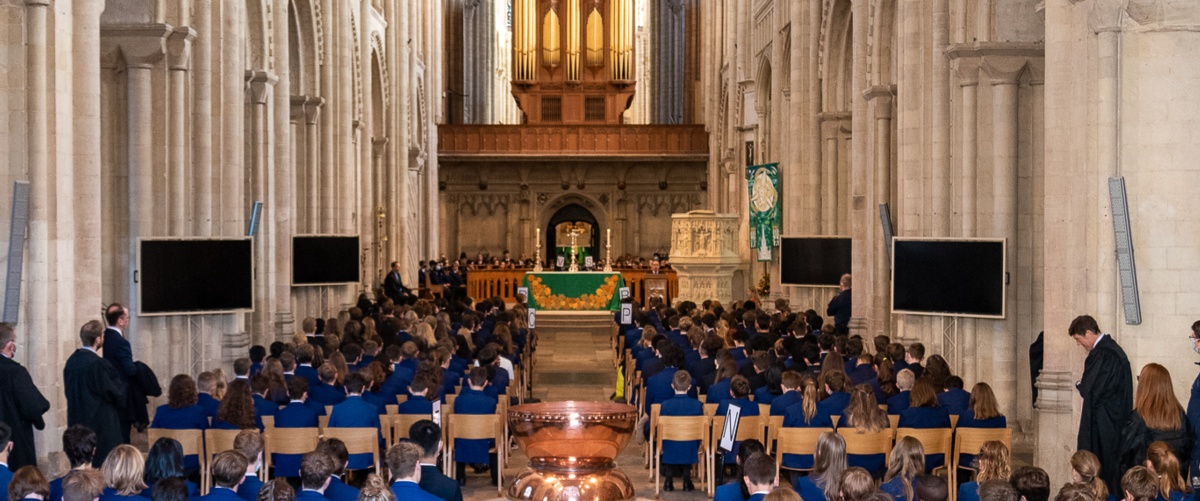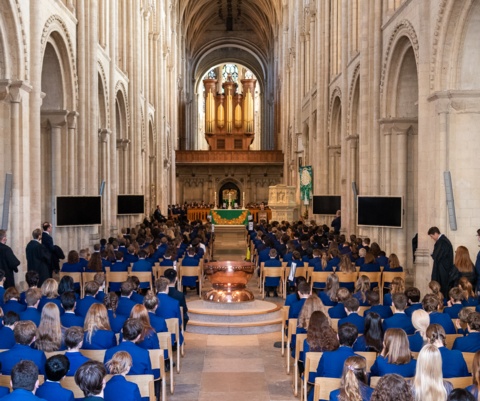Read the start of Lent Term Address from our Head, Steffan Griffiths, below:
"Norwich School terms go fast but it seems extraordinary that we are already at the start of week 4. However, I said yesterday that this week feels something like a fresh start, what with us being back in the Cathedral and with all year groups fully into the rhythm of term. In my experience, schools quickly get into the swing of things at the start of the second and third terms and there is something stabilising about such routines, something which makes us feel secure. Educationalists talk a good deal about psychological safety, that feeling of stability being a prerequisite for strong learning. It certainly feels right here: we feel we can learn when we are settled, when our heads are clear and we are not worrying about other stuff.
Yet we also want our community to be aware of and sensitive to what is going on in the world around us. There is a danger in seeking stability that we aim to do so by cutting ourselves off, cocooning ourselves in our own little world. At such a point, our safety comes from complacency and not facing up to difficult truths.
That seems important at the moment because there has been a good deal recently to cause shock and cause upset. As well as global events, whether environmental events such as the Tonga earthquake or the worrying situation in Ukraine, there have been particular criminal cases which have shocked public opinion: one thinks of the recent deaths of young children at the hands of people charged with their care; the senseless death from a random bullet in the USA of a UK astrophysicist; and the appalling murder of Ashling Murphy in Ireland. Such egregious acts of violence catch our attention because they involve the desperate cutting off of life before its time and involve a significant break in generally accepted codes of behaviour. Such events are mercifully rare but we cannot pretend that they do not happen in our world.
However, at the other end of the scale, I was fortunate to represent the school last week here in the Cathedral at a dignified event recording a long and distinguished life: it was the Thanksgiving Service for Sir Timothy Colman, a leader in this county and former Lord Lieutenant for 25 years. One of the eulogies referred to his approval of a slogan in the Eastern Daily Press, “Provincial and proud of it”. Sir Timothy’s response was as follows: “Most of the best values of English life lie beyond the shores of London”.
Such strong but understated pride in this part of the world made me think of another debate about allegations of rule-breaking: the behaviour of central government at No. 10 Downing Street during the pandemic. This is obviously not on the scale of the violent crimes mentioned earlier, though it has certainly generated strong reactions on both sides. I do not seek to make a political point, more a geographical one: people right around the country are particularly keen on what happened in No 10 because they care about how leaders in London behave and whether the rules being followed in the UK are being fairly applied by those who make them to their own behaviour. Regardless of the details to be published this week, one wonders whether the civil servants and politicians making decisions about planned events in the capital had the right balance of a sense of safety regarding their immediate surroundings and connectivity to the wider situation. They certainly seem to have been operating in a bubble rather different from those being used in schools at the time.
All this leads me to a consideration of our actions, the reasons we do certain things and the responsibility we take for the things we do. In some ways, we are what we do and say; it is how others experience us as they do not hear our internal deliberations and intentions. However, what we do and say is guided by a system of external laws and internally accepted principles built up through our experiences in families and organisations such as schools. All this might be summarised as the interplay of culture and behaviour.
You will be aware that last term pupils were involved via tutor groups in coming up with ideas for a charter of values for our school, a document which seeks to link culture and behaviour by referring to the principles by which we seek to guide our activities within the community. If we believe in x and y, what actions will help us to see and recognise x and y in practice? I am pleased to say that these have formed the basis of a document which will next be scrutinised by staff before coming back to pupils for further discussion later this term.
In the meantime, I encourage you to consider this balance of psychological safety and connectivity to the world around you; feeling secure in yourselves but ready to deal with the world as it changes around you. It will be a slightly different balance for each one of you, but I think it comes from having a clear sense of what is right and important, both to you and those around you.
Good luck indeed - I offer good wishes for the rest of the term."


